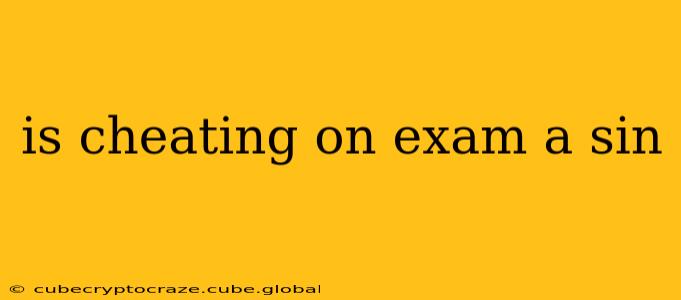Is Cheating on an Exam a Sin? Exploring Morality, Ethics, and Religious Perspectives
Cheating on an exam is a complex issue that extends beyond a simple yes or no answer. While many see it as morally wrong and potentially a violation of religious principles, the specific gravity of the act depends on individual beliefs, cultural contexts, and the severity of the infraction. This article will delve into the ethical and religious arguments surrounding exam cheating, addressing common questions and offering a nuanced perspective.
What are the ethical implications of cheating on an exam?
From an ethical standpoint, cheating violates several core principles. Primarily, it's a breach of honesty and integrity. Academic integrity is built on the foundation of honest work and fair competition. Cheating undermines this foundation, creating an unfair advantage and diminishing the value of genuine achievement. Furthermore, it demonstrates a lack of respect for the educational process itself, devaluing the learning experience for both the cheater and their classmates. Finally, it can be seen as a form of theft, stealing credit for work that wasn't earned.
Is cheating on an exam against religious teachings?
Many religions condemn dishonesty and deception. While specific interpretations vary, most faiths emphasize the importance of truthfulness, fairness, and integrity. For example, in Christianity, the Ten Commandments prohibit bearing false witness, which could be interpreted to encompass cheating. Similarly, Islam emphasizes honesty and trustworthiness as core values. Judaism places a high value on ethical conduct and academic pursuit, making cheating contrary to these principles. Many other religions share similar tenets that discourage deceitful actions, making cheating on an exam a potential violation of their ethical guidelines.
What are the consequences of cheating on an exam?
The consequences of cheating can be severe. At the most immediate level, students risk failing the exam or even the course. More seriously, institutions often impose sanctions such as suspension or expulsion. The long-term repercussions can include damage to reputation and future opportunities, as employers and graduate schools often view academic dishonesty as a serious offense. The psychological impact on the cheater should also be considered; guilt and self-deception can have lasting consequences.
Is there a difference between minor and major cheating?
Yes, the severity of cheating can vary significantly. Copying a few answers from a neighbor is different from submitting a plagiarized paper or using sophisticated methods of electronic cheating. While any form of cheating is ethically problematic, the consequences are usually proportionate to the scale of the offense. Minor infractions might lead to a warning, while more serious cases can result in harsher penalties.
How can I avoid cheating on an exam?
The best way to avoid cheating is to prepare adequately for the exam. This includes attending classes regularly, taking good notes, actively participating in discussions, and seeking help from instructors or tutors when needed. Effective time management and a dedicated study schedule are crucial. Remembering the long-term benefits of honest academic achievement can also serve as a powerful deterrent.
Conclusion:
While the exact religious or ethical implications of cheating on an exam may vary based on individual beliefs and the specific situation, the core principles of honesty and integrity remain paramount. Cheating undermines the educational process, damages personal integrity, and can lead to severe consequences. Proper preparation, a commitment to learning, and a strong ethical compass are the best ways to avoid this detrimental behavior.
